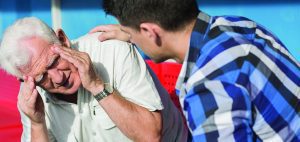

Why is this test recommended?
The results of this test will help your doctor determine what may be causing your symptoms of light-headedness or fainting spells.
The tilt table test results will help determine if other tests may be needed to help diagnose your condition.
HUTT allows the cardiologist to evaluate your blood pressure and heart rhythm. It will also help us determine the best treatment plan for your symptoms, and can even help us decide whether you will require additional testing to help diagnose your condition.
What Happens During an HUTT Test?
The test usually takes about an hour and a half to complete, but your test may be shorter depending on your symptoms and the changes we see in your vitals. It’s not a bad idea to plan to be in our office for a couple of hours. While you can continue to take your prescription medication before the test, you should not eat or drink anything except a little water for about four hours before the test.
Before the test begins, we will usually place an IV into the arm to take blood samples to measure adrenaline. Whether blood samples need to be taken will depend on your medical history. We will also place a blood pressure cuff on both arms and small electrodes on your chest to measure the electrical activity of the heart.
During the test, you will lie on your back on a motorized table and your blood pressure and heart rhythm will be taken at baseline. You will rest for about 15 minutes and then we will begin the test. As mentioned earlier, both your heart rate and blood pressure will be measured and monitored throughout the entire test.
Next, the table will be tilted at different angles, always in a position in which you are upright (you will never be upside-down). We will also check in with you throughout to see how you are feeling and if you are experiencing any symptoms. The goal of the test is to not cause you to faint, though this may happen depending on how you respond to the test. We will continue to monitor your vital signs for about 10 minutes after the test, and you will stay in our lab until any symptoms have resolved.
Experiencing bouts of dizziness or fainting due to unknown reasons? Questions about HUTT? For more information or to schedule a consultation, call 239-574-8463.
This information is for educational purposes only and is not intended to replace the advice of your doctor or health care provider. We encourage you to discuss with your doctor any questions or concerns you may have.
Dr. Joseph Freedman MD, MBA
Dr. Freedman brings many years of experience as a cutting edge cardiologist specializing in the prevention, diagnosis, and treatment of all cardiac disease. He trained at the prestigious Cleveland Clinic, continually ranked #1 in Cardiovascular Care, where he focused on cardiac imaging. He achieved five board certifications in Internal Medicine, Cardiology, Comprehensive Adult ECHO, Nuclear Cardiology, and Cardiac CT. During his tenure as the lead noninvasive cardiologist at Florida Medical Center in Ft. Lauderdale, he helped lead the hospital to achieve Level 5 chest pain certification, the highest designation of cardiac excellence. This is still the only hospital in Broward County that has achieved this esteemed accolade.
He has spoken on national health care radio programs and has appeared on local news, highlighting the latest in cardiovascular care. Dr. Freedman prides himself on being an advocate for the patient. Every patient is unique, and he works carefully with leading local and national experts to make sure patients receive the best specialty procedural care possible for that specific case. Dr. Freedman has done research in cardiac MRI studies of the heart, in nuclear scanning, and has participated in the research trials of several leading cholesterol lowering drugs. Dr. Freedman also has extensive experience in pulmonary hypertension, and ran a large clinic in Broward County for these specific and often undiagnosed patients. Dr. Freedman speaks Spanish as well.
“I specialize in combining old fashioned personalized medicine with the latest diagnostic technology and treatments. I look forward to helping you stay healthy and making sure that your heart is the last thing you need to worry about in your busy daily routine.”
Cardiac Care Group, LLC
(239) 574-8463
www.flccg.com
 Southwest Florida's Health and Wellness Magazine Health and Wellness Articles
Southwest Florida's Health and Wellness Magazine Health and Wellness Articles

